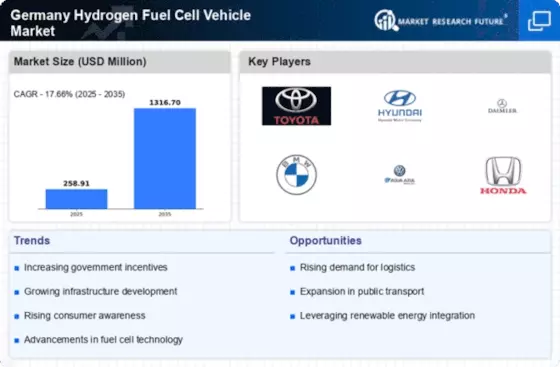The Germany Hydrogen Fuel Cell Vehicle Market is experiencing a notable transformation as it aligns with the country’s commitment to sustainable transportation and reducing carbon emissions. With a strong infrastructure for hydrogen production and distribution, Germany is becoming a pivotal player in the development and adoption of hydrogen fuel cell technology. The competitive landscape here is characterized by the presence of significant automotive manufacturers and a vigorous push from the government for clean energy solutions.
As global demand for fuel cell vehicles increases, companies operating in this space are leveraging their technological expertise to innovate and capture a larger share of the market. The drive toward a hydrogen economy within Germany not only impacts local manufacturers but also attracts international players who perceive significant opportunities in the region. BMW AG is one of the key players in the Germany Hydrogen Fuel Cell Vehicle Market, leveraging its established reputation for innovation and high-quality automotive engineering.
In Germany, BMW has invested extensively in developing hydrogen fuel cell technology, committing to both research and practical implementations in their vehicle lineup. The company's emphasis on eco-friendly and efficient transportation solutions complements the national goal of sustainability. BMW's competitive strength lies in its technological advancements, particularly its experience in integrating cutting-edge systems into vehicles while also maintaining the brand's high-performance standards. This strategic approach has enabled the company to foster a favorable position in the market, emphasizing its commitment to producing zero-emission vehicles and exploring various partnerships to enhance its hydrogen offerings.
Toyota Motor Corporation has an equally strong presence in the Germany Hydrogen Fuel Cell Vehicle Market, recognized for its pioneering efforts in hydrogen fuel cell technology through its innovative product line. The company's key offerings, particularly its hydrogen-powered vehicles, showcase Toyota's commitment to sustainable mobility solutions in Germany. With a strategic focus on expanding its hydrogen vehicle market share, Toyota has reinforced its position through various collaborations and alliances aimed at enhancing hydrogen infrastructure and technology development.
The strength of Toyota lies in its extensive research and development capabilities, which have facilitated breakthroughs in fuel cell technology, making its vehicles efficient and reliable. Moreover, the company is actively exploring mergers and acquisitions that could bolster its market footprint in Germany, securing advanced technologies and boosting its competitive edge in this evolving industry sector. In summary, both BMW AG and Toyota Motor Corporation demonstrate substantial strengths in the Germany Hydrogen Fuel Cell Vehicle Market, propelled by their innovative strategies and dedication to sustainable transportation.














Leave a Comment